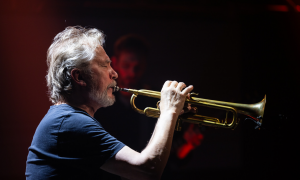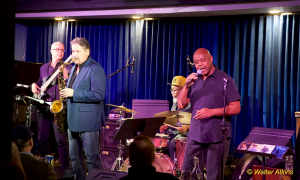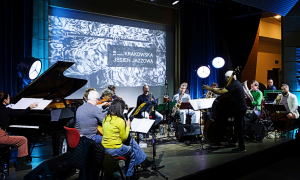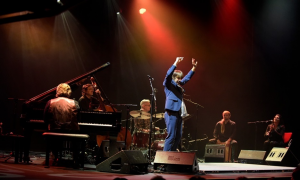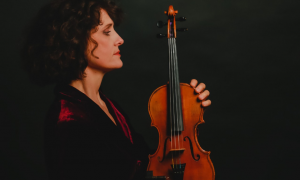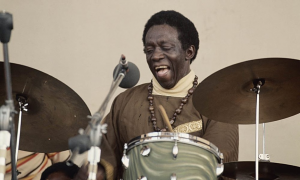Home » Jazz Articles » Live Review » Fred Hersch at the Barcelona Jazz Festival
Fred Hersch at the Barcelona Jazz Festival

Courtesy Roberto Cifarelli
. . . the Hersch we were able to see on this unforgettable night was the most solidly rhythmic and densely harmonic that our memory (and a quick random review of his discography) is capable of remembering.
Conservatori del Liceu
56 Festival de Jazz de Barcelona
Barcelona, Spain
October 29, 2024
The 56th Barcelona Jazz Festival boasted one of the most complete and balanced line-ups in recent years. Fred Hersch's solo piano concert was, without a doubt, one of its greatest nights, a performance characterized by tributes, admiration for the Brazilian world and a deep commitment to beauty.
There is no better way to enjoy the mastery of the truly great than to hear them live and alone with their instrument, a leap into the void, without harnesses or a net, which only the best can overcome with a resounding, unquestionable success. Fred Hersch did it, but it was not enough for him; he also won over the audience and marked another small notch in the history of a festival that has already far exceeded its half-century of life. His humility in manner went hand in hand with a gratifying generosity (the Cincinnati native gave three encores) and a versatility that is much more difficult to perceive in studio albums: the Hersch we were able to see on this unforgettable night was the most solidly rhythmic and densely harmonic that our memory (and a quick random review of his discography) is capable of remembering. Okay, live concerts very often—unfortunately, not always—provide that extra in the delivery of the musician involved, either in the length of the pieces or in their intensity. However, in the case of Hersch, this change of register is almost more of a mutation than an adaptation: his wisely alternating rotundity and delicacy, his skillfully managed dynamics, his masterful, forceful attack in the middle and lower registers, his physical interpretation (looks, gestures) transport us many miles beyond what his excellent—and copious—discography can provide us.
Contrary to what some Barcelonian websites have reported, the concert was not based—for the most part—on material from his most recent album Silent, Listening (ECM, 2024), an excursion into ethereal experimentation that may surprise some but is not at all new to him (check his previous duo with Ralph Alessi). Only two songs came from that album: "Akrasia," a piece from his pen, and "The Wind," composed by Russ Freeman, which he recorded on Songs Without Words (Nonesuch, 2001). The former opened the concert with an almost dodecaphonic atmosphere in its first bars, to gradually transport us to a transversal piano lyricism, which does not observe genres or styles, and was cleverly linked with "O Grande Amor" by Antonio Carlos Jobim: the first of the evening's references to the Brazilian musical ecosystem, delivered without haste to establish its unmistakable melodic-harmonic gear. And the second, "The Wind," took the song—especially at its beginning—to almost dreamlike places, very far from those in which it was conceived. It was, in turn, linked to the theme "Duet," a composition also present on Songs Without Words, in what became the second stop of the night in Brazilian lands.
Much of the concert was dominated by several tributes to musicians who have passed away, either by performing pieces by them or by Hersch's compositions dedicated, in his own words, to people whom he admires and who inspire him. The first to be invoked was Benny Golson, who died in September 2024 and whom Hersch honored on the already-mentioned Songs Without Words—the perennial "Whisper Not." He applied to it a very rhythmic and syncopated treatment to gradually accumulate harmonic layers. This helped to establish the well-known melody, which was only revealed in its entirety towards the end: certainly, one of the best moments of the night. No less intense was the one dedicated to Carla Bley, whose formidable "Sing Me Softly Of The Blues" was openly exposed, without preliminary bifurcations and already recognizable from the first bars, providing it with a deep, essential blues feeling, softly underlined by Hersch's contained but apparent bodily expressiveness. As for the works written by him as tributes to other musicians, two, in particular, stood out: "Pastorale," a complex, well-woven union between the jazz and classical universes inspired by his childhood study of classical piano and his resulting discovery of Robert Schumann, to whom this piece is dedicated; and an extensive, multidimensional "Child's Song," a theme included in Sarabande (Sunnyside, 1987) and penned for Charlie Haden, who anchored on solid ground with his double bass the ethereal evolutions of that luminous album.
Beyond the offerings and dedications, there was also room for Hersch to bring to his ground pieces like "Palhaço"—a new stop in Brazil—by Egberto Gismonti, himself scheduled to appear at the festival, or "With A Song In My Heart" by Richard Rodgers, steeped in the most illustrious tradition. The pianist faced the end of the concert, as he likes to do, with two—again linked—pieces, a ballad and something by Thelonious Monk. The ballad turned out to be a deeply touching, harmonically sumptuous "Moonlight in Vermont," and the "something by Monk" an intelligent revision of the angular "Evidence," to which he provided the inevitable dislocations and certain unexpected touches of humor, in coherent harmony with the material and its composer. The three encores already mentioned arrived: a balsamic, restorative version of Billy Joel's song "And So It Goes," and two pieces not introduced by Hersch but which we dare to specify, without too many doubts in the first case but with some caution in the second: a sensational, playful "After You've Gone" and a final reading, in classical form, which probably is an adaptation of a movement from J.S. Bach's French Suites.
Fred Hersch is now possibly at his best as a musician, and he probably knows it. His discreet, almost shy attitude only enhances an enormous, indisputable piano authority that translates into performances such as this one, a thorough, open-hearted review through the history of jazz piano via a wide and diverse repertoire that explores the infinite harmonic corners and melodic twists of its themes. This is always carried out within a respectful orthodoxy and a musicality dressed in irresistible elegance. Any black spots? We missed a reading of his magnificent, for us initiatory, "Sarabande," but that gives reason to hope for a new opportunity. A note to festival director Joan Anton Cararach: please invite Fred Hersch to return.
Tags
Live Review
Artur Moral
Spain
barcelona jazz festival
Fred Hersch
Silent, Listening
Ralph Alessi
Russ Freeman
Songs Without Words
Antonio Carlos Jobim
benny golson
carla bley
Robert Schumann
Sarabande
Charlie Haden
Egberto Gismonti
Richard Rodgers
Thelonious Monk
Billy Joel
Johann Sebastian Bach
Comments
PREVIOUS / NEXT
Fred Hersch Concerts
Support All About Jazz
 All About Jazz has been a pillar of jazz since 1995, championing it as an art form and, more importantly, supporting the musicians who make it. Our enduring commitment has made "AAJ" one of the most culturally important websites of its kind, read by hundreds of thousands of fans, musicians and industry figures every month.
All About Jazz has been a pillar of jazz since 1995, championing it as an art form and, more importantly, supporting the musicians who make it. Our enduring commitment has made "AAJ" one of the most culturally important websites of its kind, read by hundreds of thousands of fans, musicians and industry figures every month.














